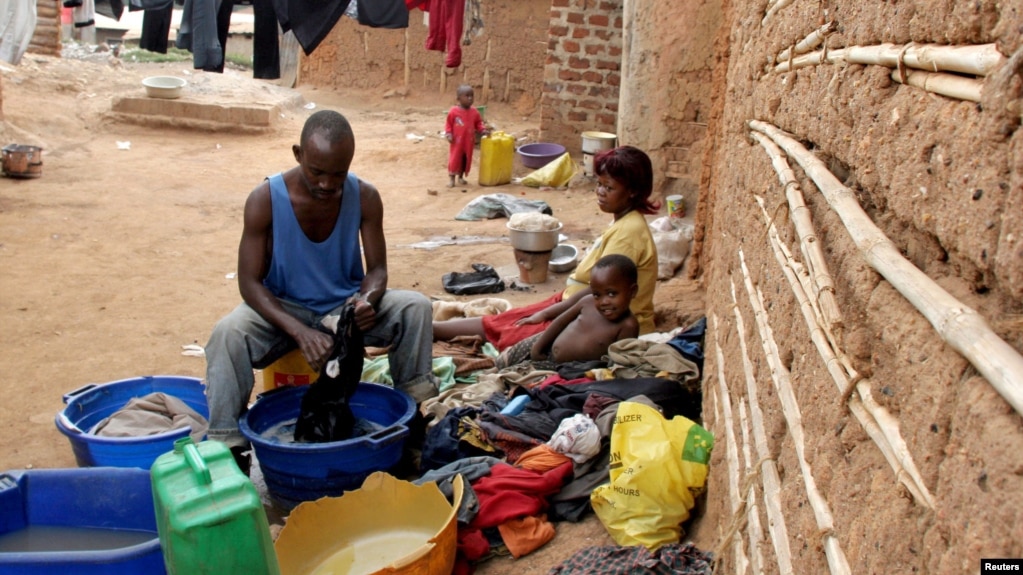Thin, bony and yawning;
The dog in Kivulu,
Panting and squatting
Like its master.
The dog in Kivulu,
Barking at naked children,
Children who sing a thanksgiving
As they leave the rubbish heaps.
The dog in Kivul,
Running away from fat flies
And scratching its tail with teeth,
Biting nothing but its own gums,
Swallowing nothing more than its own saliva.
The dog of Kivulu,
Guarding its drunkard master
And the hoard of fermenting millet,
Kwete and malwa in clay-pots.
But the dog of Kivulu
Lies by, with nothing to drink;
Nobody calls it Acaali, the bitch,
It looks on - at the trenches —
And drinks the water from the cattleshed.
 |
| A Ugandan man cleans his clothes at the Makerere Kivulu slums in Kampala source: Voice of Africa |
Source: Poems from East Africa, selected by David Cook and David Rubadiri,
East African Publishers, 1996
https://www.blogger.com/blog/post/edit/2787646074844666576/7659814838032170754
ReplyDeleteHey Bruce am also a poetry lover from Uganda. I have written several poems which are on my blog(see link). Please check them out and you can post them here for publicity. Am still budding and i hope to put out a collection soon. Thanks. My real name is KATO LOID.
Hi Kato - I checked out your blog and really liked it. I have posted one of your poems today. If anyone else is reading this, the correct link for Kato's blog is: http://loidology.blogspot.com/
DeleteHumbled
DeleteChecked link, big up for the good work
DeleteI liked this poem when I was in P7 as it came in one of our English language papers.I remember I passed it very well
ReplyDeleteI liked this poem when I was in P7 as it came in one of our English language papers.I remember I passed it very well
ReplyDeleteOne of the most influential poems. This is a linkage to one poet Henry Hallow . Whose poem entitled Building the nations captures more about what Ralph Bitamazire says in this poem. One of the most important in Ugandan decalogue.
ReplyDeleteHenry Barlow
Deleteany analysis notes of the poem: the dog of kivuli please?
ReplyDeleteI love this poem in particular. I did it on my advanced level literature class. It was one of my favourite. When In holiday I would present it to my family on gatherings and they would enjoy. Thank you Ralph
ReplyDeleteYeah..read about it @ introduction of prose& poetry@ s.5..was so interesting
ReplyDeletei have a question what makes this poem satirical
ReplyDeletewhat makes this poem satirical
ReplyDeleteA true poetic description of the squalid conditions of a Kampala slum, the abject poverty that the dwellers live in and the resignation to their fate that is all too evident. Classic and timeless.
ReplyDeleteThe dog in Kivulu symbolizes the lower class individuals who sometimes depends from people with certain position but who are irresponsible.
ReplyDeleteThe dog even though keeps busy to guard the master it is not being motivated and it suffers pests and cruised wounds.
Is the poem all about the dog
ReplyDeletei love its relevance
ReplyDeleteAnalysis of "The Dog in Kivulu" by Ralph Bitamazire:
ReplyDelete*Themes:*
1. Poverty and deprivation: The poem vividly portrays the bleak living conditions in Kivulu, emphasizing the struggles of both humans and animals.
2. Mirroring and parallelism: The dog's circumstances reflect those of its master and the community, highlighting the interconnectedness of their plight.
3. Neglect and abandonment: The dog, like the children, is left to scavenge and suffer, symbolizing the disregard for vulnerable members of society.
4. Contrast and irony: The poem juxtaposes the dog's guarding of millet and alcohol with its own thirst and neglect.
*Imagery and Symbolism:*
1. The dog's physical state (thin, bony, yawning, panting) mirrors the community's poverty and desperation.
2. The dog's actions (barking, running, scratching) convey frustration and hopelessness.
3. Naked children singing amidst rubbish heaps evoke a sense of resilience amidst adversity.
4. Fat flies and the dog's futile scratching symbolize the futility of seeking relief.
5. The dog guarding millet and alcohol while thirsty itself highlights the absurdity of prioritizing material possessions over basic needs.
6. The cattleshed water, typically reserved for animals, becomes the dog's only source of hydration, emphasizing its marginalized status.
*Poetic Devices:*
1. Repetition: "The dog in Kivulu" creates a sense of rhythm and emphasizes the dog's centrality.
2. Enjambment: Lines blend together, mirroring the seamless connection between the dog's and community's struggles.
3. Metaphor: The dog serves as a metaphor for the marginalized and oppressed.
4. Irony: The dog guards valuable resources while neglecting its own needs.
*Social Commentary:*
1. Critique of societal neglect: The poem exposes the disregard for vulnerable members, including children and animals.
2. Commentary on poverty and inequality: Kivulu's bleak conditions highlight the consequences of systemic neglect.
3. Reflection on human-animal relationships: The poem underscores the interconnectedness of human and animal suffering.
*
It was so helpful thanks alot
ReplyDelete